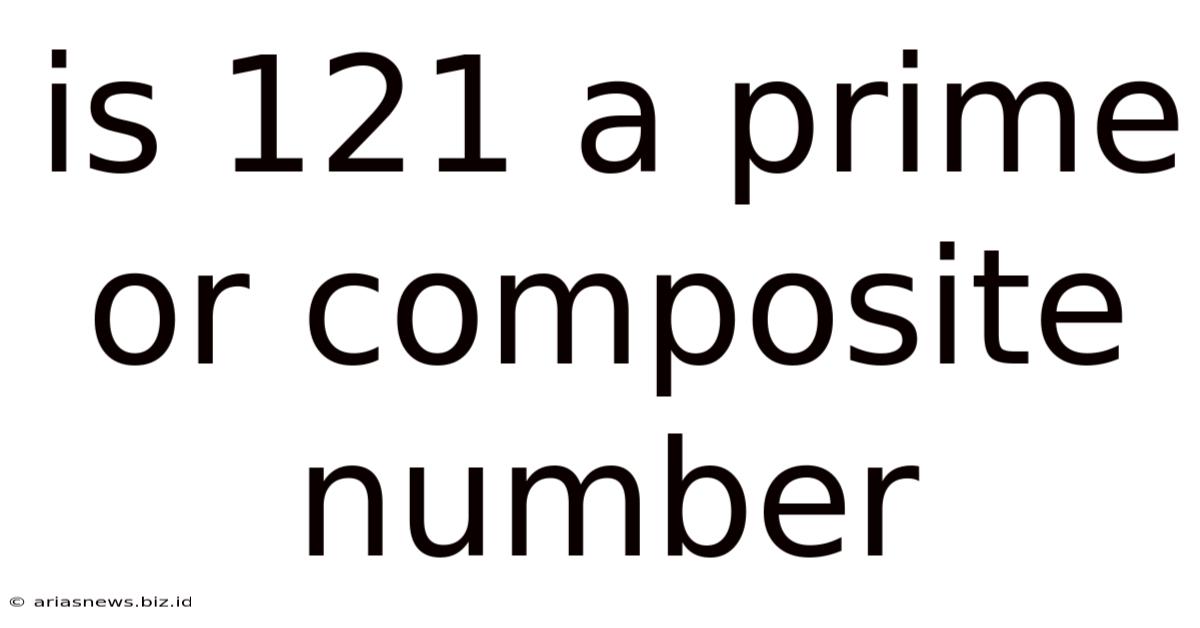Is 121 A Prime Or Composite Number
Arias News
May 11, 2025 · 4 min read

Table of Contents
Is 121 a Prime or Composite Number? A Deep Dive into Number Theory
Determining whether a number is prime or composite is a fundamental concept in number theory. This article delves into the question: Is 121 a prime or composite number? We'll not only answer this specific question but also explore the broader concepts of prime and composite numbers, methods for determining their nature, and their significance in mathematics.
Understanding Prime and Composite Numbers
Before we tackle 121, let's establish a clear understanding of the definitions:
Prime Numbers: A prime number is a natural number greater than 1 that has no positive divisors other than 1 and itself. In simpler terms, it's only divisible by 1 and itself without leaving a remainder. Examples include 2, 3, 5, 7, 11, and so on. Prime numbers are the building blocks of all other numbers.
Composite Numbers: A composite number is a positive integer that has at least one positive divisor other than 1 and itself. This means it can be factored into smaller positive integers. Examples include 4 (2 x 2), 6 (2 x 3), 9 (3 x 3), and 10 (2 x 5). Essentially, any whole number greater than 1 that is not prime is composite.
The Number 1: It's crucial to note that the number 1 is neither prime nor composite. It's a special case, considered a unit in number theory.
Determining if 121 is Prime or Composite
Now, let's focus on the number 121. To determine its nature, we need to find its divisors. We can do this through several methods:
Method 1: Trial Division
The simplest approach is trial division. We systematically check if 121 is divisible by any prime number less than its square root. The square root of 121 is 11. Therefore, we need to check for divisibility by the primes 2, 3, 5, and 7.
- Divisibility by 2: 121 is not divisible by 2 (it's not even).
- Divisibility by 3: The sum of digits (1 + 2 + 1 = 4) is not divisible by 3, so 121 is not divisible by 3.
- Divisibility by 5: 121 does not end in 0 or 5, so it's not divisible by 5.
- Divisibility by 7: 121 divided by 7 leaves a remainder.
- Divisibility by 11: This is where we find our answer. 121 divided by 11 equals 11.
Since 121 is divisible by 11 (and itself), it is not a prime number. It has divisors other than 1 and itself. Therefore, 121 is a composite number.
Method 2: Factorization
Another method is prime factorization. This involves breaking down the number into its prime factors. In the case of 121, we've already discovered that 11 x 11 = 121. Since 11 is a prime number, the prime factorization of 121 is 11². The presence of factors other than 1 and itself confirms that 121 is a composite number.
Method 3: Recognizing Perfect Squares
121 is a perfect square. It's the square of 11 (11² = 121). Perfect squares greater than 1 are always composite numbers because they have at least three divisors: 1, the number itself, and its square root.
The Significance of Prime and Composite Numbers
The distinction between prime and composite numbers is fundamental in many areas of mathematics and computer science:
-
Fundamental Theorem of Arithmetic: This theorem states that every integer greater than 1 can be uniquely expressed as a product of prime numbers (ignoring the order of the factors). This is a cornerstone of number theory.
-
Cryptography: Prime numbers play a crucial role in modern cryptography, particularly in RSA encryption, which relies on the difficulty of factoring large composite numbers into their prime factors.
-
Number Theory Research: Prime numbers are a subject of ongoing research, with many unsolved problems related to their distribution and properties. For example, the Riemann Hypothesis, one of the most important unsolved problems in mathematics, is related to the distribution of prime numbers.
Beyond 121: Exploring Other Numbers
Let's apply what we've learned to a few other numbers:
-
Is 101 a prime or composite number? Let's use trial division. The square root of 101 is approximately 10.05. We check for divisibility by primes less than 10.05 (2, 3, 5, 7). None of these divide 101 evenly. Therefore, 101 is a prime number.
-
Is 143 a prime or composite number? Trial division is again a good approach. The square root of 143 is approximately 11.96. We check for divisibility by primes less than 12. We find that 11 x 13 = 143. Therefore, 143 is a composite number.
Conclusion: 121 is a Composite Number
To reiterate, through various methods – trial division, factorization, and recognizing it as a perfect square – we conclusively determined that 121 is a composite number. Its prime factorization is 11², showcasing its divisibility by 11 (besides 1 and itself). Understanding the difference between prime and composite numbers provides a fundamental basis for exploring more complex mathematical concepts and applications. The principles discussed here are vital for anyone pursuing a deeper understanding of number theory and its applications in various fields.
Latest Posts
Related Post
Thank you for visiting our website which covers about Is 121 A Prime Or Composite Number . We hope the information provided has been useful to you. Feel free to contact us if you have any questions or need further assistance. See you next time and don't miss to bookmark.